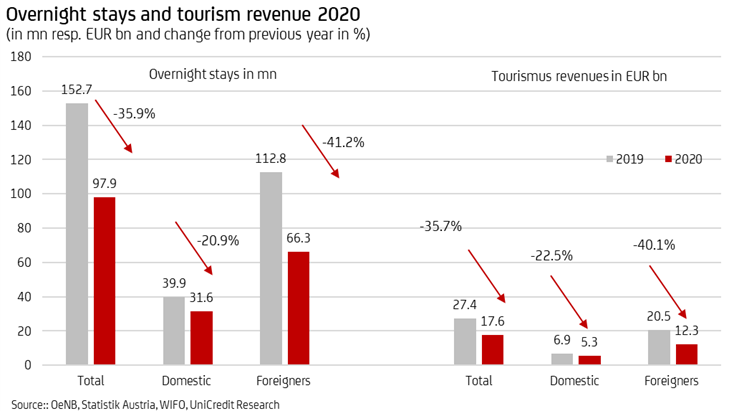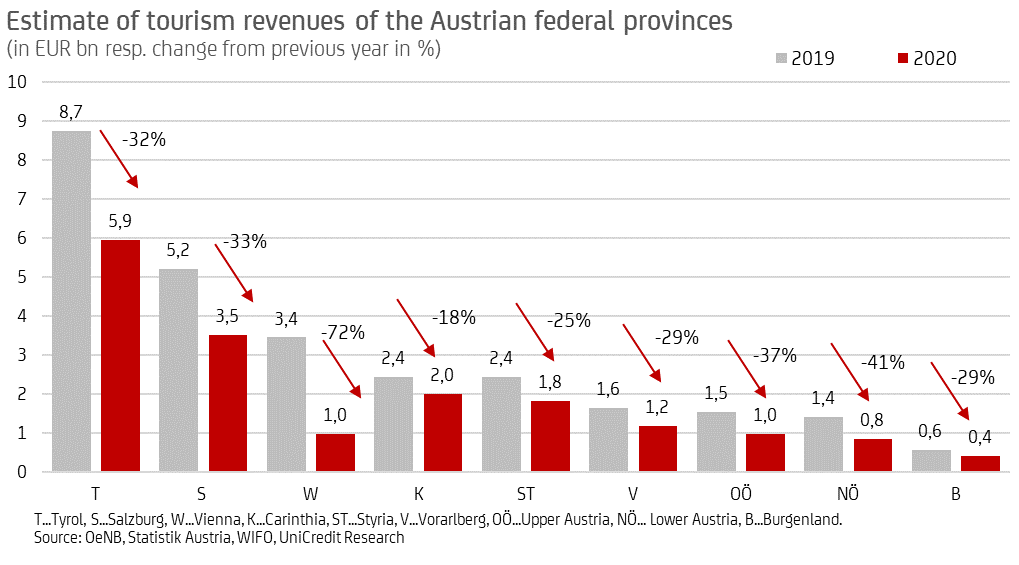UniCredit Bank Austria analysis:
Sharp drop in tourism revenue in 2020 - particularly severe in Vienna, least severe in Carinthia
- The new tourism season begins on 19 May 2021, with the opening of the economy
- As a result of the pandemic, the number of tourist overnight stays in 2020 fell to 1970 levels
- Tourism revenue from domestic and international travel fell by almost 36% in 2020 compared with 2019, to EUR 17.6 billion
- Vienna had the highest loss of revenue compared with 2019 by far, with a drop of 70%; Carinthia saw the lowest loss of revenue out of all the federal states, at less than 20%
- Despite a pronounced decrease in the number of tourists, tourist expenditure per overnight stay did not change much in 2020, standing an average of EUR 180
With the general opening up of the Austrian economy from 19 May 2021, domestic tourism companies will start to make up the ground lost during the pandemic. "The measures to curb the pandemic have led to a reduction in overnight stays in the “year of the coronavirus” 2020 for the Austrian tourist industry and a fall in tourism revenue of around 36% respectively compared with 2019. After the lost winter season and the protective measures that have to be observed, it will not be possible to close the gap in 2021 as a whole, but we are confident that the upcoming winter season will almost offset the results of the previous year", says UniCredit Bank Austria Chief Economist Stefan Bruckbauer.
Vienna saw the highest loss of revenue in 2020 and Carinthia the lowest
The tourism revenue of the individual federal states was affected by the fall in tourism during the pandemic to varying degrees, largely depending on the different tourism demographics of the states. Using a model based on the proportions that each country of origin makes up of total overnight stays in the respective federal states as well as the average expenditure of each tourist per night, UniCredit Bank Austria economists forecasted the trend in tourism revenue for the Austrian federal provinces.
The highest tourism revenue from domestic travel and international travel combined is estimated to be EUR 5.9 billion for Tyrol, which is around one third of the total revenue for Austria in 2020 of EUR 17.6 billion. Burgenland recorded the lowest tourism revenue at just under EUR 400 million or 2.3% of total revenue for Austria. "As a result of the different tourism trends, the loss of revenue in Carinthia in 2020 remained below 20%, while the City of Vienna saw by far the highest loss of revenue at more than 70% compared with 2019, according to our estimate. In Tyrol, the decline was around 32% below the Austrian average compared with 2019, as was the case in Burgenland, Salzburg, Styria and Vorarlberg", says Bruckbauer. However, with tourism representing less than 4% of the overall economy, these losses are significantly less important in Vienna than in the tourist heartland of Tyrol, where tourism accounts for almost 15% of GDP.
The decline in tourism revenue in the federal provinces is due to the sharp decline in the number of tourist overnight stays as a result of the pandemic, with numbers falling to those seen in 1970. After nearly 153 million overnight stays were recorded in 2019, only 98 million were recorded in 2020. At just under 36%, this decline in numbers was almost mirrored by the decline in revenue. Revenue from international travel fell by more than 40% to EUR 12.3 billion, while revenue from domestic travel fell by just 22.5% to EUR 5.3 billion.
Revenue from international travel fell particularly sharply
"The significant decline in revenue from international travel in 2020 was largely due to the decline in the number of tourists from more distant countries of origin, while the losses in tourism revenue from neighbouring countries were generally below average", says UniCredit Bank Austria Economist Walter Pudschedl. For example, tourism revenue from the US and China fell by more than 80%, and from Japan by more than 75%. On the other hand, the decline in spending by German tourists, who were by far the most important tourists in Austria making up more than 50% of international travel revenue, was below average at around 32%. The increased flexibility in terms of dates and the possibility of individual travel during the pandemic, during which legal conditions, for example travel restrictions, changed rapidly, had a positive effect on these figures.
Domestic tourists saving more money in 2020; foreign tourists spending a little more
"While the amount of money spent by tourists in Austria per night in 2020 remained largely unchanged compared with 2019, at an average of EUR 180, the amount spent per night by domestic tourists fell by an average of 2% to EUR 169. On the other hand, however, the amount spent per night by foreign tourists rose by almost 2% to EUR 185 per night", says Pudschedl.
The amount spent per night by foreign tourists was not at all consistent in 2020. As a rule, tourists from more distant countries of origin significantly increased their daily expenditure. The result is influenced by the particularly sharp decline in the number of overnight stays by tourists from these countries. Among other things, the proportion of business travellers from the US, China or Japan who tend to spend more money, compared with traditional holidaymakers from these countries, is likely to have increased significantly during the pandemic.
The demand for higher-quality accommodation classified as safe according to hygiene standards also increased. Seasonal patterns may also have played a role in this trend. The winter season, usually characterised by higher spending per night, was excellent until mid-March, while the summer season, with lower daily revenue from tourists from more distant countries of origin, was almost completely non-existent. As a result, the amount spent per night by tourists from China rose particularly sharply, doubling in 2020 to an average of EUR 390. The amount spent per night by tourists from Japan increased by more than 50% last year to an average of EUR 364.
"While the amount spent per night by Chinese tourists doubled, spending by tourists from Austria's neighbouring countries - as was the case with Germany - remained stable or even decreased significantly in some cases. German tourists, who account for more than 50% of the total international tourism revenue in Austria, spent an average of EUR 163 per day in 2020 and in 2019, while guests from Slovenia, Slovakia and the Czech Republic reduced their expenditure by three to six percent", says Pudschedl. This development could also be related to the trend towards camping holidays during the pandemic and the limited possibilities for cross-border shopping trips due to the ordered closures of Austrian shops.
The development of tourist spending from individual countries led to an increase in average revenue per night in only three federal states. "Only in Vienna, the federal capital, Tyrol and Vorarlberg, was the decline in tourism revenue in 2020 lower than the decline in overnight stays. In these federal provinces, the overall losses could at least be mitigated by increased revenue per night", says Pudschedl.


Further information can be found at: Tourism revenue in 2020, the year of the coronavirus, UniCredit Bank Austria, May 2021
Enquiries:
UniCredit Bank Austria Economics & Market Analysis Austria
Walter Pudschedl, Tel.: +43 (0)5 05 05-41957;
Email: walter.pudschedl@unicreditgroup.at


